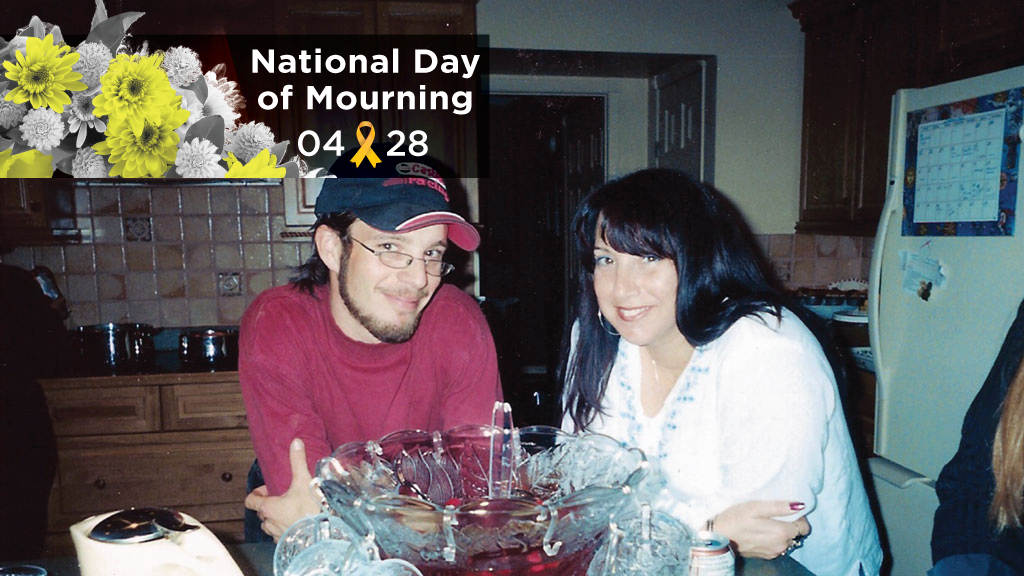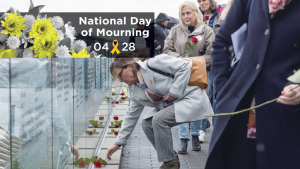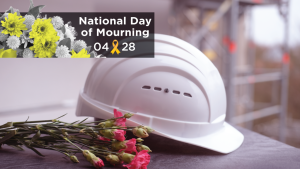Johanna LeRoux lost her son in a construction incident in 2006.
Although years have passed, she still grieves the loss every day.
LeRoux is a speaker for Threads of Life. She will be speaking at events this week in honour of the National Day of Mourning, which is held April 28, remembering those who lost their lives in a workplace injury.
“The ripple and the long-term effects of these incidents on families, they are different for every family but they’re enormous for every family,” she told the Daily Commercial News.
Micheal Fisher was a roofer for a small company. On the day of the incident, Jan. 26, 2006, he was working on a new build in Innisfil, Ont. Apparently he had been having issues with his nail gun that morning, LeRoux recalled.
“He had climbed down from the roof to fix his nail gun,” said LeRoux. “Nobody else was working on that side of the building so there were no eye witnesses to exactly what happened. They think he took off his fall restraint belt, possibly to use the washroom or something while he was working, and was just running up to the top of the ladder to test the nail gun after he fixed it. He slipped at the top of the ladder…and he landed on his head.”
He was rushed to Royal Victoria Hospital in Barrie, Ont. and then airlifted to Sunnybrook Hospital in Toronto where he was in the intensive care unit for six days before he died on Jan. 25 as a result of the head trauma.
“He was 22 at the time,” said LeRoux. “He had been working in the roofing industry for about two years. He had been a framer for about a year-and-a-half before that…He did have the old fall prevention training prior to when the Ministry (of Labour, Immigration, Training and Skills Development) came in and standardized it and improved the regulations around it and the actual training piece. He was trained under the old system where they watched a video tape and answered a true or false questionnaire and were handed and hand-written card.”
It’s ‘like it happened yesterday’
When asked if she remembers where she was when she heard the news about her son she said, “like it happened yesterday.”
“I was at work,” LeRoux recalled. “I had just come back from my lunch break and as I was walking towards my desk one of my co-workers stopped me and said reception is trying to get ahold of you because the police are trying to find you. I got to my desk. I didn’t even have time to call reception before my phone rang and it was the South Simcoe Police telling me that Micheal had been in an accident at work.”
She was in no shape to drive so her supervisor drove her to the hospital. She had to wait a few minutes before being able to see him. He was hooked up to life support, intravenous tubes and had a collar around his neck.
“He was unconscious,” LeRoux said. “What had the biggest impact, besides all of the medical equipment, was just the fact that he was pale and so completely still. He was a very active young man, always on the go and seeing him so still was really scary.”
He remained in a coma for six days and although he had several surgeries to try to reduce the swelling in his brain, he never regained consciousness.
The importance of finding support
The death had a significant impact on the family.
“One of the biggest regrets I have during that period is that I was so consumed with my own grief that instead of being the pillar of support that I should have been for my daughters, I could barely cope myself. I feel like I left them floundering,” she said, adding her oldest daughter was 18 and her youngest daughter was only 13 at the time.
“She actually carried the brunt of not only being my support system, which she was far too young to have to be, but what happens to kids when their parents lose a child is everybody asks, ‘how’s your mom? How’s your dad?’ They seldom ask the kids how they’re doing. They hear ‘make sure you take good care of your mom.’”
“At 13 years old she did not know how to take care of herself. She didn’t know how to grieve or how to cope.”
Most support groups are geared towards parents who have lost young children, so it took LeRoux a while to find a group with parents who lost an adult child. Then she found Threads of Life. She attended a regional family forum and immediately wanted to get involved.
“By the end of the weekend I wanted to do everything,” she said. “I want to be that person for someone else. I needed to go out and speak to people, to organizations and companies and tell them why this shouldn’t happen.”
Follow the author on X/Twitter @DCN_Angela.





Recent Comments
comments for this post are closed